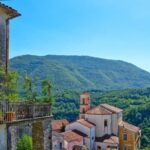Italy is not only known for its stunning architecture, delicious cuisine, and rich history but also for its deeply rooted religious traditions, especially during Holy Week. This significant week leading up to Easter Sunday is a time when Italians across the country come together to commemorate the passion, death, and resurrection of Jesus Christ.
From solemn processions to vibrant celebrations, Holy Week in Italy offers a unique blend of spirituality and cultural experiences for travelers seeking to immerse themselves in this sacred time.
During Holy Week, cities and towns throughout Italy come alive with various rituals and events that date back centuries. The historical significance of these traditions provides a glimpse into Italy’s past and the importance of Catholicism in shaping the country’s culture. From intricate processions carrying religious icons through narrow cobblestone streets to elaborate ceremonies held in majestic cathedrals, each aspect of Holy Week in Italy adds to the tapestry of this revered holiday.
Preparation for Holy Week in Italy starts weeks before with locals diligently planning and organizing their participation in various religious activities. Homes are adorned with symbolic decorations, traditional meals are prepared with care, and special services are attended with reverence.
It is a time when families gather together to reflect on the spiritual meaning of Easter while partaking in age-old customs that have been passed down through generations. By immersing oneself in these preparations, visitors can gain a deeper understanding of the significance behind each tradition they encounter during their travels throughout Italy during Holy Week.
The Historical Significance of Holy Week in Italy
Italy has a rich historical background when it comes to Holy Week, with traditions that have been passed down through generations. The observance of Holy Week in Italy dates back centuries and is deeply rooted in the country’s Catholic heritage. It is a time when communities come together to commemorate the events leading up to Easter Sunday, marking the crucifixion and resurrection of Jesus Christ.
One of the most significant aspects of Holy Week in Italy is the reenactment of the Via Crucis, or the Way of the Cross. This tradition involves participants retracing Jesus’ steps as he carried the cross to his crucifixion. Many cities and towns across Italy hold processions where individuals carry crosses through the streets, symbolizing Jesus’ journey to Calvary. These processions are often accompanied by prayers, hymns, and readings from scripture, creating a solemn and reflective atmosphere.
Another important historical aspect of Holy Week in Italy is the tradition of decorating churches with elaborate artwork and religious symbols. From intricately carved altars to vibrant floral displays, churches in Italy receive special attention during this sacred time of year. Visitors flock to these beautifully adorned churches to admire the craftsmanship and artistry that reflect the deep reverence Italians have for their faith during Holy Week.
| Holy Week Tradition | Description |
|---|---|
| Via Crucis Processions | Participants retrace Jesus’ steps carrying crosses through streets |
| Church Decorations | Elaborate artwork and religious symbols adorn churches during Holy Week |
Holy Week Preparation
Holy Week in Italy is a time of significant religious observance and tradition, and Italians go to great lengths to prepare for the solemn and joyful celebrations ahead. Here is a glimpse into how Italians get ready for Holy Week:
1. Cleaning and Decorating Homes: In preparation for Holy Week, Italians engage in a thorough spring cleaning of their homes. This practice symbolizes the renewal of life and the removal of impurities before the Easter celebration. Homes are also adorned with traditional decorations like palm fronds, flowers, and religious icons to create a festive atmosphere.
2. Attending Confession: Another important aspect of Holy Week preparation for many Italians is participating in the sacrament of confession. This spiritual practice allows individuals to reflect on their sins, seek forgiveness, and renew their relationship with God before entering into the holiest week of the Christian calendar.
3. Special Traditions: In addition to cleaning and attending confession, Italians observe various other customs leading up to Holy Week. Many families bake traditional Easter bread known as “colomba di Pasqua” or make symbolic dishes like lamb for Easter Sunday lunch. Others may participate in ceremonial processions or attend special church services as part of their preparation for this sacred time.
As Holy Week approaches in Italy, the sense of anticipation and reverence builds among communities across the country as they prepare to commemorate the passion, death, and resurrection of Jesus Christ through centuries-old traditions and rituals.
Must-Visit Churches and Cathedrals in Italy During Holy Week
Italy is a country known for its stunning churches and cathedrals, many of which hold significant importance during Holy Week. Visiting these religious sites during this time can provide travelers with a unique insight into the spiritual and cultural traditions of Italy. Here are some must-visit churches and cathedrals in Italy that are particularly special to explore during Holy Week:
- St. Peter’s Basilica: Located in Vatican City, St. Peter’s Basilica is one of the most important Catholic churches in the world. During Holy Week, this magnificent basilica hosts several papal ceremonies and masses, drawing pilgrims from around the globe.
- Duomo di Milano: The Milan Cathedral, also known as Duomo di Milano, is a striking example of Italian Gothic architecture. During Holy Week, this cathedral holds special services and processions, offering visitors a chance to witness traditional Easter rituals.
- Florence Cathedral (Duomo): The Cathedral of Santa Maria del Fiore, or simply the Duomo, is an iconic symbol of Florence. Its beautiful dome dominates the city skyline and serves as a focal point for Holy Week celebrations, including religious services and events.
These are just a few examples of the many churches and cathedrals in Italy that play a significant role in the observance of Holy Week. Each of these locations offers travelers a glimpse into the rich religious history and cultural heritage of Italy during this sacred period.
Whether you’re a devout pilgrim seeking spiritual fulfillment or a curious traveler interested in experiencing authentic Italian traditions, visiting these must-see churches and cathedrals during Holy Week can be a truly memorable and enlightening experience. Take the time to explore these architectural wonders and participate in the religious activities that take place within their hallowed walls to fully immerse yourself in the essence of Holy Week in Italy.
Traditional Italian Holy Week Foods
Italy is not only known for its rich history and stunning architecture but also for its delectable cuisine, especially during Holy Week. Italians take their food seriously, and Easter is no exception. During this time, families come together to enjoy traditional Italian dishes that are both delicious and steeped in religious symbolism.
One of the most iconic foods enjoyed during Holy Week in Italy is Colomba Pasquale, which translates to “Easter Dove.” This dove-shaped cake is similar to panettone but has a more buttery texture and is studded with almonds and candied fruits. It is a symbol of peace and resurrection, making it a fitting dessert for the Easter holiday.
Another popular traditional treat during Holy Week in Italy is Casatiello Napoletano. This savory bread is filled with cheese, salami, and hard-boiled eggs, representing the richness of life and rebirth. It is commonly enjoyed on Easter Sunday as part of a festive meal shared with family and friends.
In addition to these specific dishes, many regions in Italy have their own unique culinary traditions during Holy Week. For example, Sicilians often prepare pasta with sardines as a symbolic dish commemorating the passion of Christ. No matter where you find yourself in Italy during Holy Week, you can be sure to encounter a wide array of delicious Easter treats that celebrate both culinary excellence and religious significance.
| Traditional Italian Foods | Description |
|---|---|
| Colomba Pasquale | A dove-shaped cake symbolizing peace and resurrection |
| Casatiello Napoletano | A savory bread filled with cheese, salami, and hard-boiled eggs |
| Pasta with Sardines | A Sicilian dish representing the passion of Christ |
Holy Week Processions and Rituals
Italy is a country with deep-rooted traditions, especially when it comes to religious events like Holy Week. The observance of Holy Week in Italy is marked by a series of processions and rituals that reflect the strong spiritual beliefs of the people. These events provide visitors with a unique opportunity to witness the intersection of faith, culture, and history.
The Passion Plays and Pageants
During Holy Week in Italy, many cities and towns stage elaborate reenactments of the Passion of Christ through passion plays or pageants. These performances typically involve actors dressed in traditional costumes depicting scenes from the last days of Jesus Christ. One of the most famous passion plays in Italy is held in Sordevolo, Piedmont, attracting thousands of spectators each year.
The Stations of the Cross
Another common ritual during Holy Week in Italy is the Via Crucis or Stations of the Cross procession. This symbolic reenactment traces Jesus’ journey to his crucifixion and death, with participants stopping at various stations to pray and reflect on each event. The most renowned Via Crucis procession takes place at Rome’s Colosseum presided over by the Pope on Good Friday, drawing pilgrims from around the world.
Maundy Thursday Foot Washing Ceremony
In several Italian cities, including Rome, Florence, and Assisi, churches hold foot washing ceremonies on Maundy Thursday to commemorate Jesus washing the feet of his disciples. This act symbolizes humility and service within the Christian faith. Visitors are welcome to attend these moving ceremonies where priests wash the feet of parishioners as a gesture of humility and reverence during Holy Week in Italy.
Special Events and Festivals During Holy Week Across Different Regions
Italy is a country rich in culture and tradition, and Holy Week is no exception when it comes to showcasing the diverse celebrations that take place across different regions. From north to south, Italians partake in various special events and festivals during this significant week leading up to Easter Sunday.
Processions in Sicily
In Sicily, the city of Trapani hosts a renowned “Misteri” procession on Good Friday, where life-sized sculptures depicting scenes from the Passion of Christ are carried through the streets by devotees. This centuries-old tradition is a solemn and powerful display of faith and devotion that attracts locals and tourists alike.
The Scoppio Del Carro in Florence
One of the most unique events during Holy Week occurs in Florence with the “Scoppio del Carro” or the Explosion of the Cart. This tradition dates back over 350 years and involves a cart laden with fireworks being ignited by a mechanical dove during Easter Sunday Mass at the Duomo. The explosive display symbolizes good luck for the city’s harvests and prosperity for the coming year.
Easter Monday Celebrations in Rome
While not technically part of Holy Week, Easter Monday, also known as “Pasquetta,” is a time for Italians to continue their festivities with picnics, outdoor excursions, and cultural events. In Rome, locals often head to parks such as Villa Borghese or Castel Gandolfo for relaxation and enjoyment after the solemnity of Holy Week. It’s a great opportunity for travelers to immerse themselves in Italian traditions beyond just religious observances.
These special events and festivals during Holy Week across different regions of Italy offer a glimpse into the country’s vibrant heritage and deep-rooted customs that continue to be cherished by generations. Whether you witness an elaborate procession or indulge in traditional Easter delicacies, experiencing Italy during this sacred time provides insight into both its spiritual significance and cultural richness.
Tips for Traveling to Italy During Holy Week
Traveling to Italy during Holy Week can be a truly remarkable and spiritual experience. As one of the most important religious holidays in the country, Holy Week is observed with a unique blend of traditions, processions, and celebrations that reflect Italy’s deep-rooted Catholic heritage. To make the most of your visit during this special time, here are some tips to guide you through your journey.
First and foremost, it is essential to plan and book your accommodations well in advance. Holy Week is a popular time for both local residents and tourists to travel around Italy, especially to major cities like Rome, Florence, and Venice. Securing your lodging early will ensure that you have a comfortable place to stay amidst the hustle and bustle of the holiday festivities.
It is also advisable to familiarize yourself with the local customs and traditions associated with Holy Week in Italy. Take the time to learn about the different rituals, processions, and events taking place in the specific regions you plan to visit. This will not only enhance your understanding of the cultural significance of the holiday but also allow you to fully immerse yourself in the experience.
Lastly, don’t forget to pack appropriately for your trip during Holy Week. While Italy’s weather can vary depending on the region, it’s always a good idea to bring comfortable walking shoes, lightweight clothing for warm days, layers for cooler evenings, and a respectful attire if you plan on attending church services or processions.
By being prepared and open-minded, you can make the most out of your travels during Holy Week in Italy and create lasting memories of this spiritual journey.
Conclusion
In conclusion, traveling to Italy during Holy Week is a truly remarkable experience that allows visitors to immerse themselves in the rich traditions and celebrations of this special time. The country’s historical significance, stunning churches and cathedrals, delicious traditional foods, and spiritual processions all contribute to the beauty and richness of Holy Week in Italy.
For those planning a trip during this sacred period, taking the time to witness the various events and festivals across different regions can provide a deeper understanding of Italian culture and religious customs. From witnessing solemn processions to participating in joyful celebrations, Holy Week offers a unique opportunity to connect with both the spiritual and cultural aspects of Italy.
Overall, traveling to Italy during Holy Week can be a deeply fulfilling experience for those seeking to explore the intersection of faith, tradition, and history. Whether you are drawn to the elaborate rituals or simply want to savor authentic Italian Easter treats, immersing yourself in the beauty and richness of Holy Week in Italy is sure to create lasting memories that will stay with you long after you have left this enchanting country.
Frequently Asked Questions
Is Holy Week Busy in Italy?
Holy Week in Italy is indeed a busy time, especially in cities like Rome, Florence, and Vatican City. Pilgrims from around the world flock to these places to participate in religious ceremonies and events, making it a bustling period for tourists and locals alike.
Are Things Closed in Italy During Holy Week?
During Holy Week in Italy, many businesses, shops, and restaurants may have altered hours or even be closed on certain days, particularly on Good Friday and Easter Sunday. It is advisable for visitors to plan ahead and double-check if specific places they wish to visit will be open during this time.
Is Rome Open During Holy Week?
Rome remains open during Holy Week for visitors who want to explore the city’s historical sites, cultural attractions, and religious landmarks. While there may be some closures or schedule changes due to religious services and events, tourists can still enjoy the beauty of Rome during this significant period.

I’m a passionate traveler, writer, and Italophile. My fascination with Italy’s history, art, and culture has led me on countless adventures across the Italian landscape. Through “I Live Italy,” I share my love for this extraordinary country and aims to inspire others to explore its boundless beauty.





